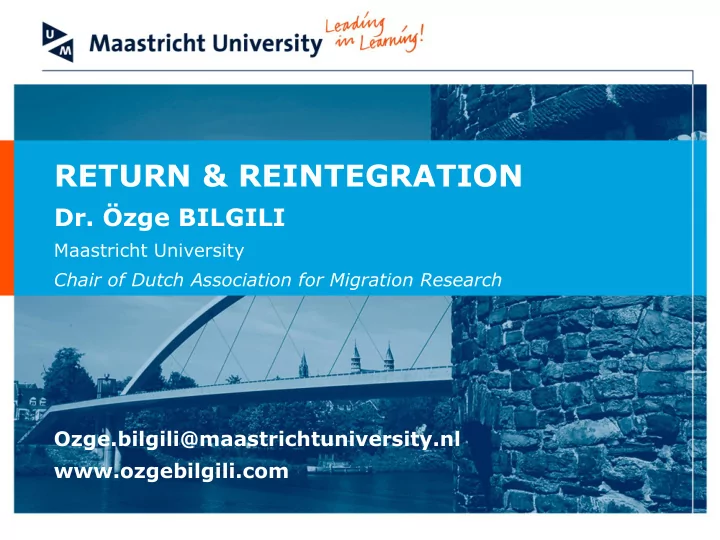

RETURN & REINTEGRATION Dr. Özge BILGILI Maastricht University Chair of Dutch Association for Migration Research Ozge.bilgili@maastrichtuniversity.nl www.ozgebilgili.com
How can policy enable return or promote sustainable return and reintegration? 1. Overview of the topic of reintegration 2. Current projects of reintegration 3. Successes and limitations of reintegration projects Comparative Research on the Assisted Voluntary Return and Reintegration of Migrants Maastricht Graduate School of Governance
Maastricht Graduate School of Governance
Sustainable return and reintegration Definition of concepts Multi-dimensional integration: economic, socio-cultural, • political Multi-level integration: individual, household, community, • national Objective and subjective reintegration • The individual has reintegrated into the economic, social and cultural processes of the country of origin and feels that they are in an environment of safety and security upon return Maastricht Graduate School of Governance
Sustainable return and reintegration Operationalisation Reintegration = no re-migration? • High level of return intention among returned Afghan • rejected asylum seekers Sustainable return = reintegration? • Reintegration: key precondition for sustainable return • Sustainable return: lack of reintegration and obstacles • to re-migrate Maastricht Graduate School of Governance
Comprehensive migration management Assisted Voluntary Return Programmes • Safe and humane return for migrants without a legal right to reside in a • country IOM – over 46000 people from over 70 host countries in 2013 • All EU countries, except for Poland • Multiple AVR programmes in most countries • Difficulty to assess the impact assisted voluntary • return policies Lack of consensus on the definition of concepts • Lack of accessible data – sample frame, short to long term • analysis Variation among different types of migrants and settings • Maastricht Graduate School of Governance
Comprehensive migration management Comparative Research on the Assisted Voluntary Return and • Reintegration of Migrants Analysis of the return decision of migrants, including irregular migrants • Development of a framework for defining and measuring sustainability of • approaches to voluntary return Assessment of what factors determine sustainable return and reintegration • Methodology • Across countries of origin, transit and destination • Total of 273 migrants and return migrants interviewed across the 15 countries • Destination countries Transit countries Origin countries • Australia • Greece • Afghanistan, Bangladesh, Ethiopia, • The Netherlands • Indonesia Iraq, Pakistan, Sri • United Kingdom • Turkey Lanka, Sudan, Vietnam • Switzerland Maastricht Graduate School of Governance
Factors determining the decision to return Economic migrants vs. Asylum seekers and refugees Maastricht Graduate School of Governance
Decision to return Conditions in destination country more important than conditions origin • country – employment and legal status Beyond the scope of direct policy interventions: desire to reunite with family • members at home; change of family circumstances Policy interventions • Not a major influence on the decision to return • Facilitate the decision to return • Disseminate information on return programmes, especially in transit • countries Turkey: lack of knowledge, external donor funds, strict mandate for eligibility, need for return • assistance There is a fine line between facilitating return and encouraging it. Any policy intervention in this area should be designed to allow potential returnees to make their own decisions, rather than encouraging them towards any particular option. Maastricht Graduate School of Governance
Measuring sustainable/durable return The individual has reintegrated into the economic, social and cultural processes of the country of origin and feels that they are in an environment of safety and security upon return Develop an index for measuring multi-dimensional reintegration: economic, • socio-cultural, and political-security dimensions Reintegration as a precondition for sustainable return • 71% - high level of safety and security • 64% - sociocultural dimension • 54% - economic dimension • 37% of returnees reintegrated overall • Returnees to Iraq vs. To Vietnam and Pakistan • Maastricht Graduate School of Governance
Promoting reintegration and sustainable return Individual factors • Migration cycle, including experiences prior to migration and in the • destination country Structural factors during return including the community of return • and attitudes from locals Role of assisted voluntary return programming • Economic migrants more likely to be reintegrated than those who migrated for other reasons, including political and Returnees who had a sense of belonging security reasons to the community prior to migration and return to the same community after migration are more likely to be reintegrated. Maastricht Graduate School of Governance
Limitations Pilot project to assess the methodology, not an evaluation • Scale and scope of research • Robust research in the future: Application of the developed tool • Larger and representative sample of participants • Comparison with the local population and pre-migration • situation Medium to long term assessment of impact • Determining role of AVR reintegration packages • No comparison with those who have not received assistance, between • different types of assistance Maastricht Graduate School of Governance
Discussion point Lack of reintegration is not the only reason to • consider remigration Removal of root causes may not be sufficient to ensure • sustainable return What are the main reasons for remigration? • Maastricht Graduate School of Governance
Thank you for your attention Dr.Özge BILGILI Maastricht University Chair of Dutch Association for Migration Research Ozge.bilgili@maastrichtuniversity.nl www.ozgebilgili.com Maastricht Graduate School of Governance
Recommend
More recommend